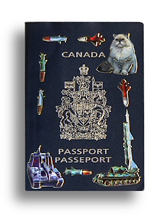
|
Lorna Mills and Sally McKay
Digital Media Tree this blog's archive OVVLvverk Lorna Mills: Artworks / Persona Volare / contact Sally McKay: GIFS / cv and contact |
View current page
...more recent posts
From the CBC
Some constitutional scholars argue that the so-called reserve power of a governor general is so archaic and unused that it should not be relied upon in contemporary situations — the electorate should always be the ultimate decider — which is why Gov. Gen. Jean is getting so much conflicting advice of late.Now somehow I can bring this all back to the Magna Carta, because, for some strange reason, it doesn't seem to be discussed enough in blogger circles
The three main reserve powers that a governor general has are to dismiss a prime minister, to dissolve Parliament (or not) and to delay or refuse royal assent to legislation, which has been used only once before, in Alberta during the Depression.
These constitutional conventions are not written down and so involve a fair amount of subjectivity on the part of the incumbent.
In Jean's case, the fact that she is a Quebec francophone, was appointed by the Liberals and was accused of separatist leanings at one point (which she denied) may also factor into her decision making, some observers argue, if only because she might not want to be seen dragging her high office into petty controversy.
But those anti-monarchists who ask why we have a non-elected official deciding who will govern miss a point: virtually every western republic in the world (save the U.S.) has a dual system involving a head of state and a head of government, based largely on the Westminster model, for just these eventualities. At some point, somebody has to decide.
In fact, in India, a democratic republic with a history of fleeting coalitions, the head of state, the president, has taken on the difficult task of trying to herd coalition partners together and to, shades of Jack Layton and Stéphane Dion, spell out their commitments in written form.
The U.S. invests its reserve powers in the president, which can prove problematic when he uses his "royal prerogative" to dole out controversial pardons just as he leaves office or to decide on his own what constitutes something like torture.


From wikipedia
By 1215, some of the most important barons in England had had enough, and they entered London in force on 10 June 1215,[1] with the city showing its sympathy with their cause by opening its gates to them. They, and many of the moderates not in overt rebellion, forced King John to agree to the "Articles of the Barons", to which his Great Seal was attached in the meadow at Runnymede on 15 June 1215. In return, the barons renewed their oaths of fealty to King John on 19 June 1215. A formal document to record the agreement was created by the royal chancery on 15 July: this was the original Magna Carta. An unknown number of copies of it were sent out to officials, such as royal sheriffs and bishops.
The most significant clause for King John at the time was clause 61, known as the "security clause", the longest portion of the document. This established a committee of 25 barons who could at any time meet and overrule the will of the King, through force by seizing his castles and possessions if needed. This was based on a medieval legal practice known as distraint, but it was the first time it had been applied to a monarch. In addition, the King was to take an oath of loyalty to the committee.
Clause 61 essentially neutered John's power as a monarch, making him King in name only. He renounced it as soon as the barons left London, plunging England into a civil war, called the First Barons' War. Pope Innocent III also annulled the "shameful and demeaning agreement, forced upon the King by violence and fear." He rejected any call for restraints on the King, saying it impaired John's dignity. He saw it as an affront to the Church's authority over the King and the 'papal territories' of England and Ireland, and he released John from his oath to obey it.
So this means that Ratzinger is going to get involved, but at some point in the near future, Harper will want to divorce his wife causing a break with all Papal authority to create the Church of Canada. I, of course, will chronicle these future events for wikipedia.